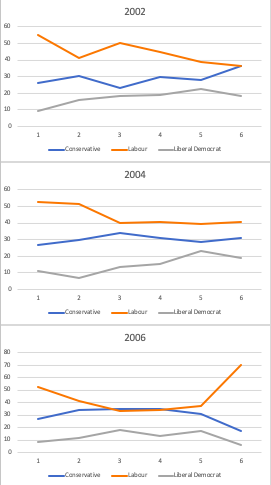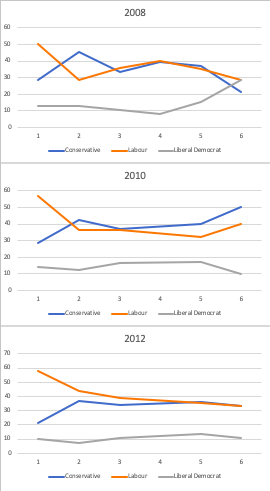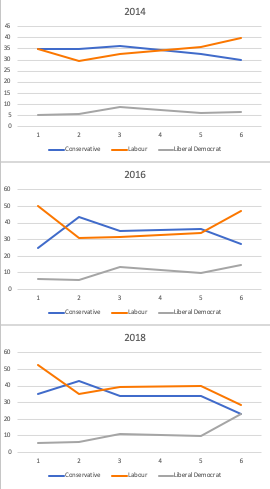Are you a social studies teacher in Florida? If so, please consider joining us in your state council, and connect with a thousand other social studies across the state. Your state council does a great many things, but it also works to stay connected to the national social studies conversation, and it is active in the National Council for the Social Studies’ House of Delegates. (And you should join NCSS too!).

FCSS House of Delegates Members Steve Masyada, Cherie Arnette, and Jennifer Jolley
During the House of Delegates session, resolutions drafted and sponsored by the Florida Council passed on a straight voice vote. These two resolutions address issues of concern in our field and, we hope, may make some level of difference in the state and national conversation.
Resolution 02-01
Supporting Social and Emotional Learning in School
This resolution addresses the recent research in both civics education and in the broader field on ensuring that students have access to the curriculum, tools, and resources they need to address their social and emotional learning.
Co-Sponsors
Association of Teachers of Social Studies/United Federation of Teachers- New York City
College and University Faculty Assembly
Early Childhood and Elementary Education Community
Georgia Council for the Social Studies
Massachusetts Council for the Social Studies
Nebraska State Council for Social Studies
Oregon Council for the Social Studies
Rationale
Research, surveys, and recent developments in Florida and other states suggest that increasingly, students need stronger supports in school in the area of social and emotional learning (SEL). The pressures students face within schools and the broader community are significant, and we must ensure that they are provided the opportunity to become knowledgeable, responsible, caring members of their communities. Understanding risks, thinking critically, developing empathy, and knowing how to engage in self-care can help students deal with the obstacles to success they face on a day to day basis (1);
WHEREAS; “Social and emotional learning is the process through which children and adults acquire and effectively apply the knowledge, attitudes, and skills necessary to understand and manage emotions, set and achieve positive goals, feel and show empathy for others, establish and maintain positive relationships, and make responsible decisions,” (2); and
WHEREAS; Florida has recently joined other states in requiring schools to spend time addressing student mental health; and
WHEREAS; that required time is often less than a full day of school over the course of the year; and
WHEREAS; research by Levine and Kawashima-Ginsberg (2017) suggests that social and emotional learning should be a significant component of a strong civics program that produces ‘more ethical and effective citizens’; and
WHEREAS; research within the field of social and emotional learning suggests that supporting students in their social and emotional learning by giving them the tools to address their own mental and emotional health, fostering a school culture and climate that allows students to develop empathetic relationships that help them feel both safe and loved, and providing them the opportunity to practice necessary decision-making skills all comprise elements of a strong SEL program; and
WHEREAS; integration of an effective SEL program requires integration into the broader school curriculum and culture rather than a stand alone approach that provides less than a full school day of learning; and
WHEREAS; the National Council for the Social Studies has itself suggested the importance of social and emotional learning, especially for elementary students within the social studies; now
THEREFORE, BE IT RESOLVED; that NCSS should advocate for every state to enact and enforce expectations for an integrated approach to social and emotional learning that draws on the most current research in SEL across all grade levels, so that students are given the opportunity to grow as both participants in civic life and as human beings. We also call for NCSS to develop a guide for teachers seeking to integrate elements of SEL into their own social studies curriculum, addressing the question of how we might align social and emotional learning with our content and our pedagogy.
References
- Elias, M. J., Zins, J.E., Weissberg, R.P., Frey, K.S., Greenberg, M.T., Haynes, N.M., Kessler, R., Schwab-Stone, M.E., & Shriver, T.P. (1997). Promoting Social and Emotional Learning: Guidelines for Educators. Alexandria, VA: ASCD.
- From Collaborative for Academic, Social, and Emotional Learning (CASEL) (2019). Overview of SEL. Retrieved 14 Aug 19 from https://casel.org/overview-sel/"
Resolution 04-04
Protecting Student Journalism Against Censorship and Retaliation
This resolution is of a piece with similiar resolutions passed by other educational organizations across the country. It reflects the importance of democratic practices and opportunities for engaged learning on the part of students, while also encouraging the modeling of democratic principles of behavior when it comes to conceptions of press freedom and student rights. It also encourages us to think upon the legal framework surrounding student free press rights.
Co-Sponsors
Association of Teachers of Social Studies/United Federation of Teachers- New York CIty
College and University Faculty Assembly
Georgia Council for the Social Studies
Human Rights Education Community
Nebraska State Council for Social Studies
Massachusetts Council for the Social Studies
Oregon Council for the Social Studies
Rationale
Elements of inquiry are increasingly a heavy focus of social studies pedagogy and curricular approaches, and allow for students to engage in the practices of civic life and civic literacy as they gain experience with questioning, disciplinary literacy, research, and informed action, with varying degrees of integration into traditional social studies instruction. Student journalism, which may fall under the auspices of both social studies and language arts, is one area of education that aligns well with these demands of inquiry, and is widely recognized as the gateway to participatory civics. Students working on school-sponsored news media learn irreplaceable civic skills, including evaluating the credibility of information sources, understanding and explaining the workings of government agencies, and gathering facts to support persuasive arguments about issues of social and political concern (1). Indeed, the national C3 Framework, with an inherent expectation of media literacy within the context of inquiry, encourages student voice and choice in the pursuit of civic knowledge and practice. Students are able to do their best journalistic work only in a climate that encourages them to grapple with challenging issues free from fear that they, or their journalism teachers, will face retaliation for unflattering news coverage.
WHEREAS, consuming and creating news about current events is recognized as a foundational part of an effective civics education; and
WHEREAS, school-sponsored journalistic media provides students with a uniquely effective vehicle to learn and share information about the workings of government; and
WHEREAS, with the estimated loss of 33,000 jobs at newspapers across America since 2008 (2), student media increasingly serves as the “information lifeline” supplying school news to the entire community (3); and
WHEREAS, students widely report that they are intimidated from using journalistic media to discuss contemporary social and political issues, including one 2016 university-led survey in which 53 percent of female high-school student journalists and 27 percent of male student journalists said they had refrained from writing about a topic important to them, because they feared adverse reaction from school authorities (4); and
WHEREAS, in its 1988 opinion, Hazelwood School District v. Kuhlmeier (5), the U.S. Supreme Court established a minimal threshold for freedom of the student press, which over time has proven to be an educationally unsound level of institutional control, irreconcilable with the effective teaching of foundational constitutional principles and values, and has consistently faced encroachment by districts, schools, and even the courts themselves (6); and
WHEREAS, fourteen states and the District of Columbia have enacted laws extending a modest degree of legally protected press freedom to student journalists above-and-beyond that provided by the Hazelwood decision (7), leaving undisturbed a school’s legitimate authority to withhold material that is dangerous, unlawful, or likely to incite a disruption; and
WHEREAS, strong civic education demands students have the opportunity to practice the rights and responsibilities of citizenship in the pursuit of inquiry; and
WHEREAS, students learn regard for First Amendment principles not just from textbooks and lectures, but from observing first-hand whether fundamental constitutional liberties are valued, respected and practiced by the governmental authority figures in their everyday lives (8); and
WHEREAS, a broad array of civic and educational organizations that value both civic learning and student rights, have called for strengthening the legal protections for student journalists at this time of critical need for civic literacy, including the American Bar Association, the National Council of Teachers of English, the American Society of News Editors, and many others (9); now
THEREFORE, BE IT RESOLVED: that NCSS should promote and advocate for laws fortifying the protection of student journalism, so students are guaranteed the freedom to distribute the lawful, non-disruptive editorial content of their choice in school-sponsored journalistic media; students and educators are protected against retaliation for journalistic work that provokes disagreement, challenges majoritarian views, or exposes shortcomings in institutional policies and practices; and administrators, teachers, and students should be educated about the rights and responsibilities of journalists in American society.
Citations
- Ed Madison, How a journalism class is teaching middle schoolers to fight fake news, THE CONVERSATION (June 5, 2017).
- Elizabeth Grieco, U.S. newsroom employment has dropped by a quarter since 2008, with greatest decline at newspapers, PEW RESEARCH CENTER (July 9, 2019).
- Frank LoMonte, A free press shouldn’t stop at the schoolyard, CNN.COM (Nov. 29, 2017).
- Piotr S. Bobkowski & Genelle I .Belmas, Mixed Message Media: Girls’ Voices and Civic Engagement in Student Journalism, GIRLHOOD STUDIES, Vol. 10 at 89-106 (Mar. 2017).
- 484 U.S. 260 (1988).
- Dan Kozlowski, “Unchecked Deference: Hazelwood’s Too Broad and Too Loose Application in the Circuit Courts”, Journal of Media Law & Ethics
- Jennifer Karchmer, Student press freedom laws gain momentum, QUILL (Apr. 16, 2018).
- University of Kansas researchers have documented a positive correlation between practicing high school journalism in a school where First Amendment values are respected and students’ sense of “civic efficacy,” defined as their belief that they can use their voices to have an impact on social and political issues. The findings are summarized at http://civicsandjournalists.org/wp-content/uploads/2015/11/Results-hando…
Copies of the endorsement resolutions of the ABA, NCTE and ASNE are available on the website of the Student Press Law Center at https://splc.org/new-voices/"
These resolutions, and others adopted on voice vote by the NCSS House of Delegates must still get final approval from the NCSS Board of Directors in the spring.
FCSS sees these resolutions as an opportunity to speak with the voice of our teachers, and to encourage the direction of the national conversation within social studies.
If you have an idea for a resolution you would like to see drafted and submitted, please feel free to contact FCSS Legislative Chair,Dr. Steve Masyada, to see about making it happen!










